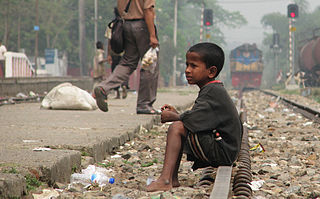Related Research Articles

Poverty is a state or condition in which an individual lacks the financial resources and essentials for a certain standard of living. Poverty can have diverse environmental, legal, social, economic, and political causes and effects. When evaluating poverty in statistics or economics there are two main measures: absolute poverty which compares income against the amount needed to meet basic personal needs, such as food, clothing, and shelter; secondly, relative poverty measures when a person cannot meet a minimum level of living standards, compared to others in the same time and place. The definition of relative poverty varies from one country to another, or from one society to another.

The poverty threshold, poverty limit, poverty line, or breadline is the minimum level of income deemed adequate in a particular country. The poverty line is usually calculated by estimating the total cost of one year's worth of necessities for the average adult. The cost of housing, such as the rent for an apartment, usually makes up the largest proportion of this estimate, so economists track the real estate market and other housing cost indicators as a major influence on the poverty line. Individual factors are often used to account for various circumstances, such as whether one is a parent, elderly, a child, married, etc. The poverty threshold may be adjusted annually. In practice, like the definition of poverty, the official or common understanding of the poverty line is significantly higher in developed countries than in developing countries.
ChildFund, also known an ChildFund International, and formerly known as Christian Children's Fund, is a child-focused international development organization that provides assistance to children facing poverty and other challenges in 24 countries, including the United States. ChildFund's headquarters are located in Richmond, Virginia, United States.
The Annie E. Casey Foundation (AECF) is a charitable foundation focused on improving the well-being of American children and youth.
In economics, a cycle of poverty or poverty trap is when poverty seems to be inherited, preventing subsequent generations from escaping it. It is caused by self-reinforcing mechanisms that cause poverty, once it exists, to persist unless there is outside intervention. It can persist across generations, and when applied to developing countries, is also known as a development trap.

Child poverty refers to the state of children living in poverty and applies to children from poor families and orphans being raised with limited or no state resources. UNICEF estimates that 356 million children live in extreme poverty. It is estimated that 1 billion children lack at least one essential necessity such as housing, regular food, or clean water. Children are more than twice as likely to live in poverty as adults and the poorest children are twice as likely to die before the age of 5 compared to their wealthier peers.
Child Care & Early Education Research Connections is a joint project of the National Center for Children in Poverty (NCCP) at Columbia University, the Child Care Bureau of the U.S. Department of Health and Human Services, and the Inter-university Consortium for Political and Social Research (ICPSR) at the University of Michigan. Launched in 2004 through a cooperative agreement, Research Connections produces an interdisciplinary, Web-based, relational database of more than 10,000 research documents and public use data sets on topics related to child care and early education. In addition, Research Connections conducts literature reviews, develops and disseminates materials designed to improve child care policy research, provides technical assistance to researchers and policy makers, conducts data analysis workshops, synthesizes findings into policy research briefs, and provides support to the Child Care Policy Research Consortium.
NORC at the University of Chicago, previously the National Opinion Research Center, is an independent social research organization in the United States. Established in 1941, its corporate headquarters is located in downtown Chicago, with offices in several other locations throughout the United States. Organized as an independent corporation, more than half its board comes from faculty and administration of the University of Chicago. It also jointly staffs some of the university's academic research centers.
The second of the United Nations Millennium Development Goals focuses on achieving Universal Primary Education. This goal aims to ensure global access to complete primary education for all children, regardless of gender, by 2015. Education plays a crucial role in achieving all Millennium Development Goals, as it equips future generations with the necessary tools to combat poverty and prevent diseases such as malaria and HIV/AIDS.
Conditional cash transfer (CCT) programs aim to reduce poverty by making welfare programs conditional upon the receivers' actions. The government only transfers the money to persons who meet certain criteria. These criteria may include enrolling children into public schools, getting regular check-ups at the doctor's office, receiving vaccinations, or the like. CCTs seek to help the current generation in poverty, as well as breaking the cycle of poverty for the next through the development of human capital. Conditional cash transfers could help reduce feminization of poverty.

The McCourt School of Public Policy is one of eleven constituent schools of Georgetown University in Washington, D.C. The McCourt School offers master's degrees in public policy, international development policy, policy management, data science for public policy, and policy leadership as well as administers several professional certificate programs and houses fifteen affiliated research centers. The McCourt School has twenty-one full-time faculty members, ten visiting faculty members, more than one-hundred adjunct faculty members and approximately 450 enrolled students across the various degree and executive education programs.
Child Trends is a nonprofit, nonpartisan, research center based in Bethesda, Maryland, that conducts research on children, children's families, child well-being, and factors affecting children's lives.

In the United States, poverty has both social and political implications. In 2020, there were 37.2 million people in poverty. Some of the many causes include income, inequality, inflation, unemployment, debt traps and poor education. The majority of adults living in poverty are employed and have at least a high school education. Although the US is a relatively wealthy country by international standards, it has a persistently high poverty rate compared to other developed countries due in part to a less generous welfare system.
Despite India's 50% increase in GDP since 2013, more than one third of the world's malnourished children live in India. Among these, half of the children under three years old are underweight.

Suniya S. Luthar was founder and executive director of AC Groups nonprofit, Professor Emerita at Teachers College-Columbia University, and Co-founder Emerita at Authentic Connections Co. She had previously served on the faculty at Yale University's Department of Psychiatry and the Yale Child Study Center and as Foundation Professor of Psychology at the Arizona State University.
The term juvenilization of poverty is one used to describe the processes by which children are at a higher risk for being poor, suffer consistent and long-term negative effects due to deprivation, and are disproportionately affected by systemic issues that perpetuate poverty. The term connotes not just the mere existence of child poverty but the increase in both relative and absolute measures of poverty among children as compared to both other vulnerable groups and the population at large.
The Office of the Assistant Secretary for Planning and Evaluation (ASPE) is the principal advisory group to the United States Secretary of the Department of Health and Human Services (HHS) on policy development and provides coordination and support for HHS's strategic and policy planning, planning and development of legislation, program evaluation, data gathering, policy-related research, and regulatory program.

A street child in Bangladesh is a young person "for whom the street has become his or her habitual abode and/or source of livelihood; and who is inadequately protected, supervised, or directed by responsible adults”.
Early childhood education in the United States relates to the teaching of children from birth up to the age of eight. The education services are delivered via preschools and kindergartens.
Disability in Kenya "results from the interaction between individuals with a health condition with personal and environmental factors including negative attitudes, inaccessible transport and public buildings, and limited social support. A person's environment has a huge effect on the experience and extent of disability." Having a disability can limit a citizen's access to basic resources, basic human rights, and social, political and economic participation in Kenyan society. There are three forms of limitation of access linked to disability: impairment, disability, and handicap. An impairment is "the loss or abnormality of psychological, physiological or anatomical structure or function." A disability results from an impairment as "the restriction or lack of ability to perform an activity in the manner considered normal for a human being", and the requirement for accommodation. Finally, a handicap "results from a disability, and limits or prevents the fulfilment of a role that is normal for that individual."
References
- ↑ "NCCP - Topics". www.nccp.org.
- ↑ Koball, Heather; Smith, Sheila (October 23, 2019). "National Center for Children in Poverty Moves to Bank Street Graduate School of Education". National Center for Children in Poverty (Tumblr Blog). Retrieved December 9, 2019.
- ↑ "NCCP - 2011 Director's Report". www.nccp.org.